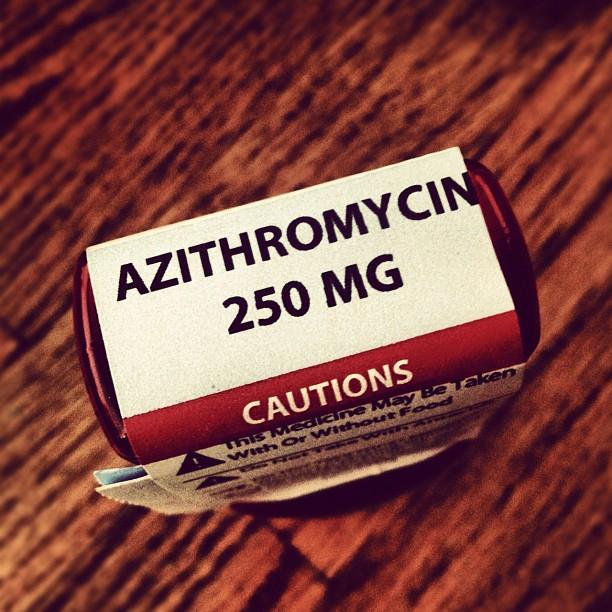A large new study has found that outpatient use of the antibiotic azithromycin is associated with an increased risk of cardiovascular and non-cardiovascular death compared with use of amoxicillin, US researchers reported this week in JAMA Network Open.
The retrospective cohort study looked at nearly 8 million prescriptions given to nearly 3 million patients over a 16-year period and found that, compared with the use of amoxicillin, azithromycin was associated with approximately twice the risk of cardiovascular death and non-cardiovascular death within 5 days of exposure.
Benefits outweigh risk
Overall, the total number of deaths in the study was quite small, and the findings do not establish that azithromycin caused these deaths. But they add to the evidence that the antibiotic is linked to increased risk for QT-interval prolongation, which can cause an irregular heartbeat and increase the risk of sudden cardiac death in certain at-risk populations.
Those concerns led the US Food and Drug Administration (FDA) to change the labeling on azithromycin in 2011, to warn against use of the antibiotic in patients with risk factors for ventricular arrythmia.
Then, in 2013, after reviewing studies reporting an increase in cardiovascular deaths in patients taking azithromycin, the FDA issued a warning that the antibiotic can cause abnormal changes in the electrical activity of the heart. The agency also advised healthcare professionals to consider the risk of fatal heart rhythms with azithromycin when considering treatment options for patients who are at risk of cardiovascular events.
Given this history, the lead author of the study said the findings weren't surprising, and stressed that the benefits of azithromycin still outweigh the potential risks.
"The benefits of using azithromycin to treat serious infections such as pneumonia are well established and should outweigh the very small possible risk of cardiovascular death in the large majority of cases," said Jonathan Zaroff, MD, a cardiologist at Kaiser Permanente Northern California. "Physicians will need to use their judgment in the rarer situations when the patient has very serious heart disease and there are alternative antibiotics which might be effective in treating the infection."
A large epidemiologic study
The study, conducted by researchers with Kaiser Permanente Northern California, Chapman University, and drug maker Pfizer (which funded the research), included patients from age of 30 to 74 in Southern and Northern California who received an outpatient prescription for oral azithromycin or amoxicillin at Kaiser Permanente facilities from 1998 through 2014.
Amoxicillin was selected as the comparator because it's prescribed for the same type of conditions as azithromycin but is not linked to increased risk of cardiovascular events.
The primary outcomes were cardiovascular death, including deaths from myocardial infarction, heart failure, arrhythmia, stroke, and sudden cardiac death. Secondary outcomes included all-cause death and non-cardiovascular death. The researchers calculated the risk of cardiovascular or non-cardiovascular deaths after controlling for a variety of factors, including patient demographics, cardiovascular conditions, other comorbidities, types of infections being treated, and other medications.
"Our study was better able to control for the type of infection being treated compared with prior studies and was uniquely able to assess the exact cause of death in the study population," Zaroff said.
Overall, there were 7.8 million antibiotic exposures among more than 2.9 million patients over the study period, with azithromycin accounting for 22.2% and amoxicillin the rest. The mean age of patients was 50.7 years.
Compared with those receiving amoxicillin, patients receiving azithromycin had higher rates of pneumonia (14% vs 3.5%), chronic obstructive pulmonary disease (20.6% vs 7.9%), and asthma (22.6% vs 10.4%). They were also more likely to be taking cardio-protective medications and to have had a non-cardiovascular-related emergency department encounter 30 days before taking antibiotics.
Azithromycin was prescribed more frequently for pulmonary infections, while amoxicillin was dispensed more frequently for ear, nose, and throat infections.
Total deaths over the study period was low: 485 occurred within 10 days of the antibiotic prescription date, and 256 (52.8%) were cardiovascular deaths, with 112 of those (44%) classified as sudden cardiac deaths. Of the non-cardiovascular deaths, the most common causes were lung disease (18.3%), infection (14.8%), cancer (16.2%), and diabetes (12.2%).
Analysis of the outcomes showed that, compared with amoxicillin, patients were at significantly higher risk of cardiovascular death within 5 days of the prescription date (hazard ratio [HR], 1.82; 95% confidence interval [CI], 1.23 to 2.67), but not sudden cardiac death (HR, 1.59; 95% CI, 0.90 to 2.81). The adjusted risk difference for cardiovascular death for azithromycin within 5 days of the prescription date was 12.79 per 1 million prescriptions. The results were not significant within 6 to 10 days of the prescription date.
Increased risk of cardiovascular death within 5 days was also observed for those patients in the top decile of the cardiovascular risk score (HR, 1.71; 95% CI, 1.06 to 2.76).
The observed associated risk among patients taking azithromycin was even greater for all-cause death (HR, 2.17; 95% CI, 1.44 to 3.26) and non-cardiovascular death (HR, 2.00; 95% CI, 1.51 to 2.63) within 5 days.
Zaroff said this finding was a surprise, since a link between azithromycin and non-cardiovascular deaths had not been observed in previous studies. But he and his colleagues don't believe azithromycin caused these deaths.
"We believe it is due to the underlying differences in the people receiving azithromycin compared to those receiving amoxicillin, which we were not able to control with our statistical methods," he said. "The fact that the most common causes of non-cardiovascular death were lung disease and cancer, which are not related to the use of azithromycin, supports this belief."
Reminder of potential harms
Marc Scheetz, PharmD, who directs the Pharmacometric Center of Excellence at Midwestern University and is a member of the antibiotic stewardship team at Northwestern Memorial Hospital in Chicago, said the results aren't surprising and don't change the way he views azithromycin, since the study was so large and the number of deaths so low.
"These are exceedingly low event rates," he said.
But Scheetz, who was not involved in the study, noted that the findings are another reminder of the importance of antibiotic stewardship.
"We're finding out more and more that antibiotics are not harmless," he said. "You should never get an azithromycin prescription just in case. But if you have an infection and this is the right antibiotic to treat your infection, you can rest assured that there is still a very, very low risk, at least for cardiovascular mortality."

























